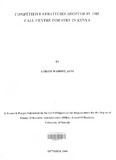| dc.description.abstract | Strategic management is the process of formulating and implementing strategies to accomplish long term goals and sustain competitive advantage. Strategy is a firms “game plan” (Pearce and Robinson, 2007). It is a comprehensive action plan that identifies the long term direction for an organization and guides resource utilization to accomplish organizational goals with sustainable competitive advantage. The competitive strategy of an organization is the range of products and services offered by an organization and the number of different industries and markets in which it competes.
This study had two objectives. They were to first, determine the various competitive strategies being used by the call centre firms and secondly to establish the challenges that are faced by operators in the call centre. The study was based on a descriptive survey design. The major purpose of the descriptive survey design was to describe the state of affairs as they existed in the call centre industry and obtain information that described existing phenomena by analyzing a cross section of the population and gathering data through the questionnaire method.
Primary data was collected from the 19 call centre operators who had registered licenses with the Communications Commission of Kenya (CCK) using a semi- structured questionnaire. The mail survey method was used to collect the data from the respondents. Quantitative data collected was analyzed using descriptive statistics such as percentages, frequencies and arithmetic mean scores. The data is presented using tables, graphs, pie chats, bar graphs and narratives.
According to the findings the key challenges faced by call centers included; delayed payments, high cost of network connection, old and inefficient equipment, lack of government support, stringent industry regulations, staff ability and skills, negative industry publicity concerning level of staff wages. In order to survive in the market, call centers operators have formulated strategies that enable them to not only survive in the market, but also make profit. Such strategies are aimed at either making the customer satisfied with the service/product of simply offer price advantage to the customer.
The main limitation of this study is the limited information concerning the call centre industry in Kenya. Many of the players in the industry are essentially interested in operating both business process outsourcing and call centre firms where a majority of western companies outsource back-office services from local companies to market for them their products and services.
Most of the call centre operators in Kenya have not yet registered their business operations with the Kenya Business Process Outsourcing and Call Centre Society (KBPOCC). The KBPOCC is the organization given the mandate by the government to introduce and give a set of standards and ethics of management practices relating to leadership, customer service, human and technical resources and operations guidelines in the Call centre market .
The call centre operators believe that they can make it on their own and do not see the need of cooperating together under one umbrella body. The general feeling is that the society would still need to convince prospective businesses that their information is safe with the Kenyan call centers and that the society has a way of enforcing and upholding the standards and ethics governing call centre management. The researcher could therefore not get a conclusive list of exactly how many call centre operators there are in the country apart from those registered with the CCK which are 19 in number.
There is also evidence to show that many training institutions are offering training in the call centre operations yet the KBPOCC does not know their backgrounds and whether they are qualified to offer this training in the first place.
Further research needs to cover a wider scope of the call centre industry. Future research could cover other KBPOCC players and other stakeholder’s perceptions of the competitive strategies used by the operators. Research is also needed to find out how government policies affect the success of the call centers. Similar research could be carried out in future to track progress made by call centers along various competitive strategies. | en |

